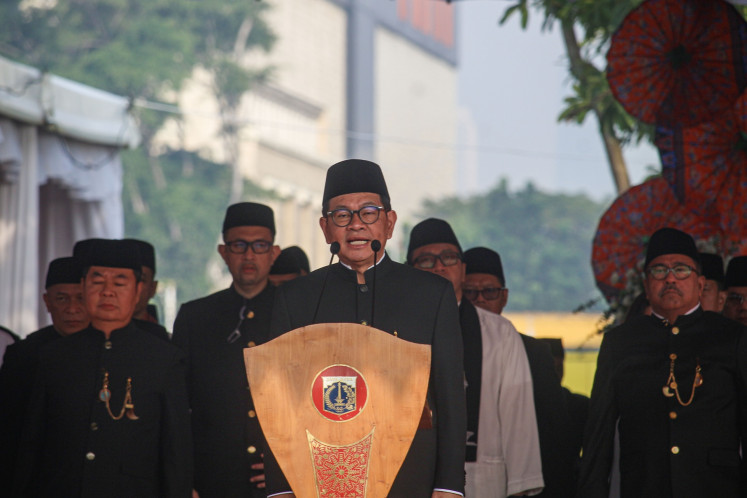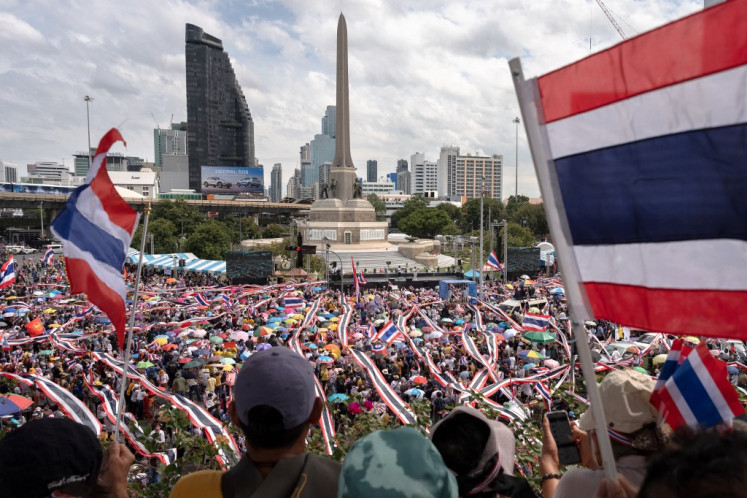Popular Reads
Top Results
Can't find what you're looking for?
View all search resultsPopular Reads
Top Results
Can't find what you're looking for?
View all search resultsRI offers lower import tax on Japanese cars in reciprocal deal
The government is looking into the possibility of reducing import duties on Japanese-produced cars should the East Asian country be willing to do the same thing for Indonesiaâs agriculture and fishery products, a senior official has said
Change text size
Gift Premium Articles
to Anyone

T
he government is looking into the possibility of reducing import duties on Japanese-produced cars should the East Asian country be willing to do the same thing for Indonesia's agriculture and fishery products, a senior official has said.
Bachrul Chairi, the Trade Ministry's director general for international trade and cooperation, said on Wednesday that the government could lower its import duties on Japanese (CBU) cars to 5 percent this year if Japan carried out reciprocal measures for Indonesia's commodities.
'Basically, Indonesia can turn the initial note but with the requirement that Japan accommodates our interests in the agriculture and fishery industries,' he said after a closed-door meeting on free trade agreements at the Office of the Coordinating Economic Minister.
Bachrul said that a number of Indonesian products like bananas and tunas were still subject to high tariffs or prohibited from entering Japanese markets.
Under the Indonesia-Japan Economic Partnership Agreement (IJ-EPA), which went into effect in 2008, Japan listed rice, wheat, meat, pineapples, bananas and starch, among others, as sensitive products.
Indonesia currently imposes a 28.1 percent import tax on Japanese cars with engine capacities of between 1,500 cc and 3,000 cc. The tax will be gradually lowered to zero percent by 2023 as agreed to by both parties under the IJ-EPA.
After intensive talks between the two parties in 2012, Japan reported that Indonesia had agreed on Japan's request to accelerate the lowering of import tariffs to 20 percent between 2013 and 2015 and to 5 percent this year.
Japan, the second largest foreign investor in Indonesia, previously threatened Southeast Asia's largest economy with a dispute settlement case at the World Trade Organization (WTO).
Industry Minister Saleh Husin said that the government would review the possibility of granting Japan's request but argued that it was important to keep Indonesia's local component industry growing.
I Gusti Putu Surywirawan, the Industry Ministry's director general for metals, machinery, transportation equipment and electronic industries, said that it would be difficult for the country to lower CBU import duties to the level requested by Japan.
'We're trying to attract more automobile production in Indonesia. If we lower the import tariff this year, I'm afraid that many will opt for importing CBUs rather than assembling or manufacturing cars here,' he said.
Bachrul also said that the government was committed to solving disputes with Japan under the IJ-EPA within two to three months.
Indonesia and Japan have so far achieved zero or low tariffs for around 92 percent of products.
Saleh, Trade Minister Thomas Lembong, Coordinating Economic Minister Darmin Nasution and Investment Coordinating Board (BKPM) head Franky Sibarani met on Wednesday to discuss matters related to a number of Indonesia's trade agreements with trading partners.
Among the discussed agreements were the IJ-EPA, the ASEAN-Japan free trade agreement and the Trans-Pacific Partnership.









